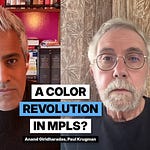The Australian playwright S. Shakthidharan’s Counting and Cracking is a sweeping, multigenerational, and multilingual family epic (it runs nearly three-and-a-half hours, and the mostly South Asian cast delivers the story in English, Tamil, and Sinhalese), but it is also the story of how democracy and pluralism came apart in Shakthidharan’s native Sri Lanka, where his grandfather served as a cabinet minister before the civil war that wracked the country from 1983 until 2009.
Anand caught up with Shakthidharan this week after seeing the play performed, and the two talked about how he came to write the story, what he learned while researching his family’s history and deep connection with the history of Sri Lankan democracy, and what the play has to tell us about the current American political condition and how quickly a society can find itself turning the corner from neighbors to enemies.
I'm very excited to be talking with great playwright S. Shakthidharan, who has this incredible new play, which I saw in New York, called Counting and Cracking. Thank you so much for talking with The Ink.
Good to see you, man.
On the night that I saw the play, which just blew me away, blew my wife away, that although it was a play about democracy and pluralism in Sri Lanka, it felt like one of the most important interventions in the cultural dialogue around the American 2024 election that I had in a while.
It may not have been the intention, I'm sure it was, but it landed that way for a lot of us in the room who were talking about it afterwards. And I wanted to start with the title, Counting and Cracking, because the play is about the straining and breaking of democracy and pluralism in Sri Lanka and the turning of all against all, or group against group. And there's this notion that you quote, of democracy as counting sometimes and cracking sometimes. What is counting and what is cracking in the context of the play?
Yeah, so the play is called Counting and Cracking, and it comes from a quote from my great-grandfather, actually, who was a politician in Sri Lanka. And he wrote in a letter, "Democracy is the counting of heads within certain limits and the cracking of heads beyond those limits." And for him in Sri Lanka, what that meant was that he spent the early part of his political career as a lonely Tamil in an otherwise Sinhalese political cabinet in the government of Sri Lanka.
And he was a champion for equality. And you know he really fought for that for many years. But by the end of his political career, he had given up on government as a place which would adequately support minorities and by then was starting to violently persecute them.
And he dealt with this by retreating or advancing, depending on your political point of view, into a version of his more tribal self, his more village identity, growing up in Jaffna, in his village of Urumpirai, where they resisted intruders into their village way of life, whether it be the British or the nationalistic government.
He has a memory of his mother breaking pots over the heads of the British who tried to come in and tell them how to live their lives. And he kind of finished his life brokenhearted by the civil war that was breaking out in Sri Lanka and talking about sometimes needing to crack heads in self-defense to protect one's community and one's way of life and having given up on the possibility of counting in Sri Lanka, even though he'd spent most of his political life fighting for that.
So counting — democracy as this notion of, you know, kings used to decide things. Now we decide things by counting who wants what —
Yep
Versus cracking.
And what we're talking about here is self-defense. Just to be clear.












